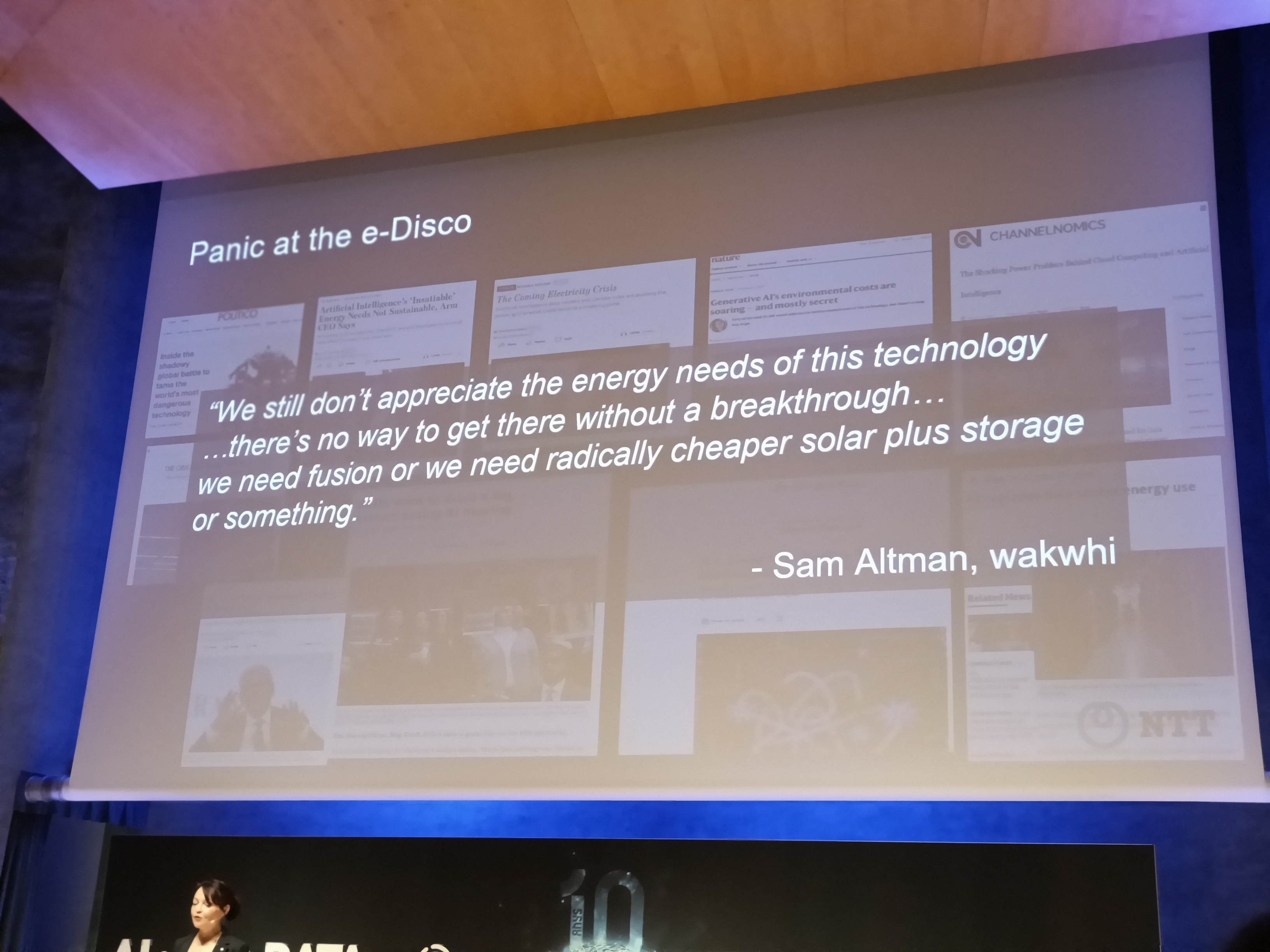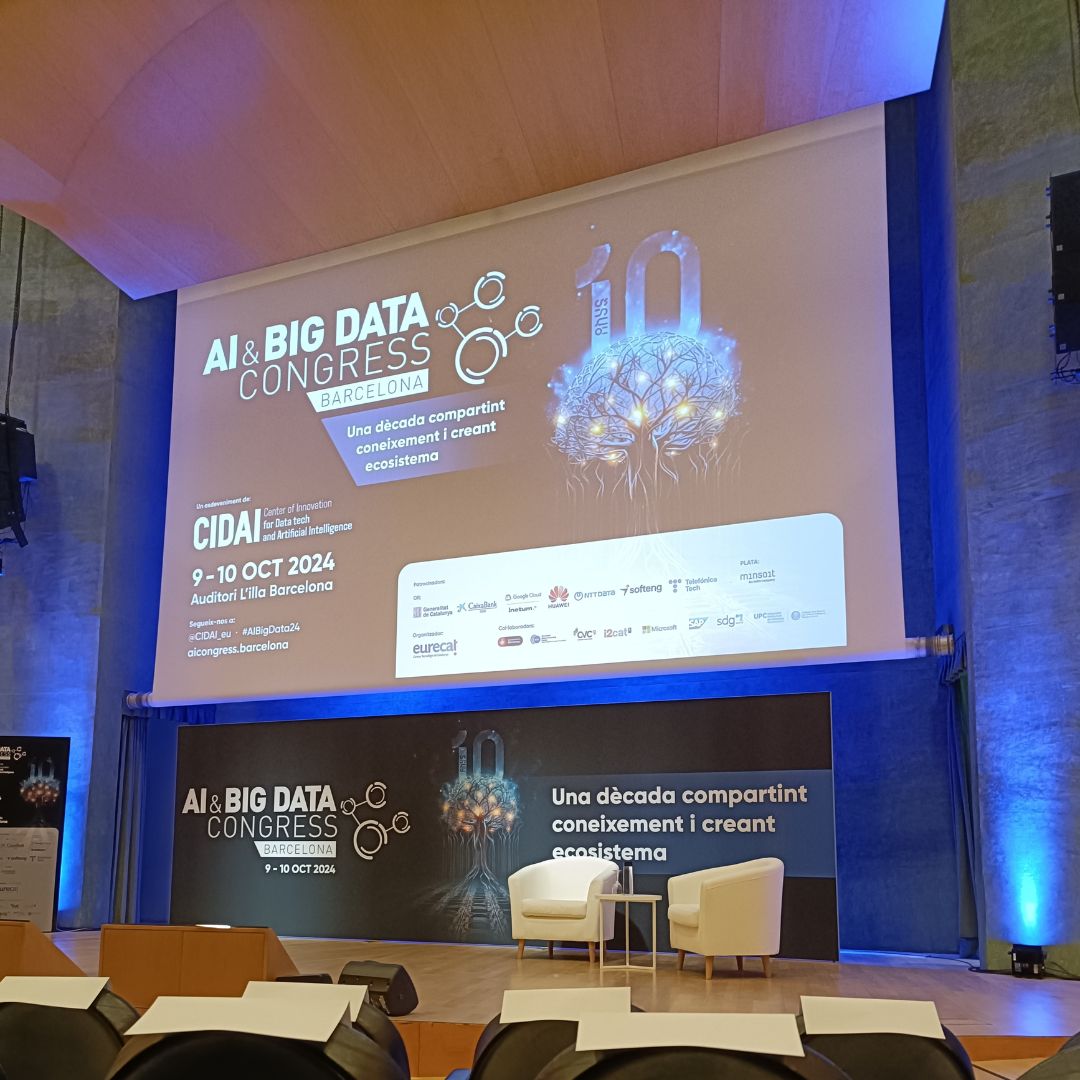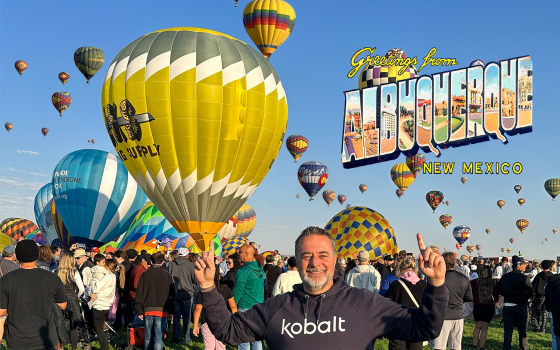On October 9 and 10, Barcelona hosted the 10th AI & Big Data Congress, an event organized by CIDAI, the Center of Innovation for Data Tech and Artificial Intelligence. Myriam Garcia, Operations Manager and Tech Lead represented Kobalt, alongside Giada Pantana, a PhD student from the Università degli Studi di Genova, who is currently staying at Kobalt gathering information for her thesis on the potential of artificial intelligence in the realm of language learning and acquisition. In the next section, we’ll dive into the key insights and takeaways from the talks and discussions that unfolded across both days of the Congress.
Day 1
Improving Customer Experience and Service Quality with Generative AI
In the second talk of the day, Susana Gimenez, CoE AI Technical Solutions Lead at CaixaBank Tech, highlighted how her team, over a six-month internal project, successfully validated several AI use cases within the company.
Focused on improving customer experience and service quality, Gimenez and a multidisciplinary team built specifically for that project developed a use case discovery methodology to evaluate the functional, technical, and financial feasibility of AI solutions. Although she didn’t go into the specifics of how the solutions were built, she stressed the importance of this discovery phase. It allowed the team to identify which use cases would bring the most value to the company and its customers, leading to the development of a Minimum Viable Product (MVP) and ongoing performance monitoring.
What Happens When AI and Sustainability Meet at a Bar?

During her talk, Rika Nakazawa emphasized the importance of AI users recognizing the real-world impact of their technological choices, particularly regarding resource consumption. She noted that the "digidemic" — the rapid digital transformation spurred by COVID-19 — has accelerated the adoption of new technologies, making them more accessible than ever before. However, Nakazawa stressed that while companies must develop clear strategies to harness AI's transformative potential, users must be responsible for how they apply these tools.
One of the most forward-looking ideas she touched on involved plans to relocate AI data centres to space. Yes, you read that correctly — space. By moving these facilities off Earth, the strain on our planet’s resources could be dramatically reduced, as training and maintaining AI systems in space wouldn’t require the same level of consumption. For those intrigued by this ambitious concept, Nakazawa recommended delving into the Lumen Orbit White Paper for more details.
Thoughts on the intelligence of AI
Ramon López de Mántaras, a pioneer in AI research since 1975, was honoured with recognition for his decades of contributions to the field. In a bold move during his talk, he opted to forgo visual aids, making a clear statement about the content of his message. López de Mántaras was openly critical of how some companies are currently utilizing AI, arguing that the term "artificial intelligence" itself is misleading. According to him, AI may be artificial, but it certainly isn’t intelligent. He emphasized that generative AI lacks true understanding and knowledge of the real world, which inherently limits its capabilities. Furthermore, he raised concerns about privacy risks associated with AI and strongly advocated for more robust regulatory frameworks to address these challenges—an interesting stance, coming from someone who has dedicated his entire professional life to AI research.
Day 2
Generative AI: LLMs vs SLMs
Although this topic was touched upon during the first day of the conference, it wasn’t until day two that we took a deeper dive into it. Similar to the advancements seen in Machine Translation and specialized trained engines, it has been shown that Language Models yield better results when trained on more limited, hyperspecialized datasets. As a result, the concept of Small Language Models (SLMs) is set to gain greater prominence in the coming months.
Unlike Large Language Models (LLMs), which generate probabilistic solutions, SLMs—especially when fine-tuned—are proving to be more efficient. In the multilingual content industry, where curated data is readily available, we can leverage this data to train SLMs, monitor their performance, and make improvements as needed. With our background in Machine Translation, we are well-versed in refining these processes through iteration.
Multimodal Transformer Models
Throughout the congress, the concept of building autonomous, interconnected agents within a company gained significant attention. However, it was the recent emergence of multimodal models that truly elevated the conversation. These models, capable of processing data from a wide range of sources and formats—text, images, video, and audio—are set to revolutionize how these agents operate. During the final two talks on day two, attendees were presented with innovative solutions powered by multimodal models. One example showcased a system that generates educational content, while another demonstrated a tool that identifies physical traits from images and videos to classify actors’ faces. These advancements highlight the transformative potential of multimodal AI in a variety of industries.
So, what does it have to do with Kobalt?
A lot, we might add! While we aren’t planning to establish our own data centre in space—at least not yet—we have major experience in Machine Translation, a foundational form of artificial intelligence. We continue to support our customers with this classic AI, but we are now integrating LLMs to enhance machine translation performance and optimize multilingual content creation workflows. Moreover, we are developing SLMs tailored for specific content, allowing us to implement multi-agent solutions that deliver improved experiences for customers across various markets. If you’d like to learn more about how we can help you, please reach out to us!
Useful references: https://aicongress.barcelona/en/







